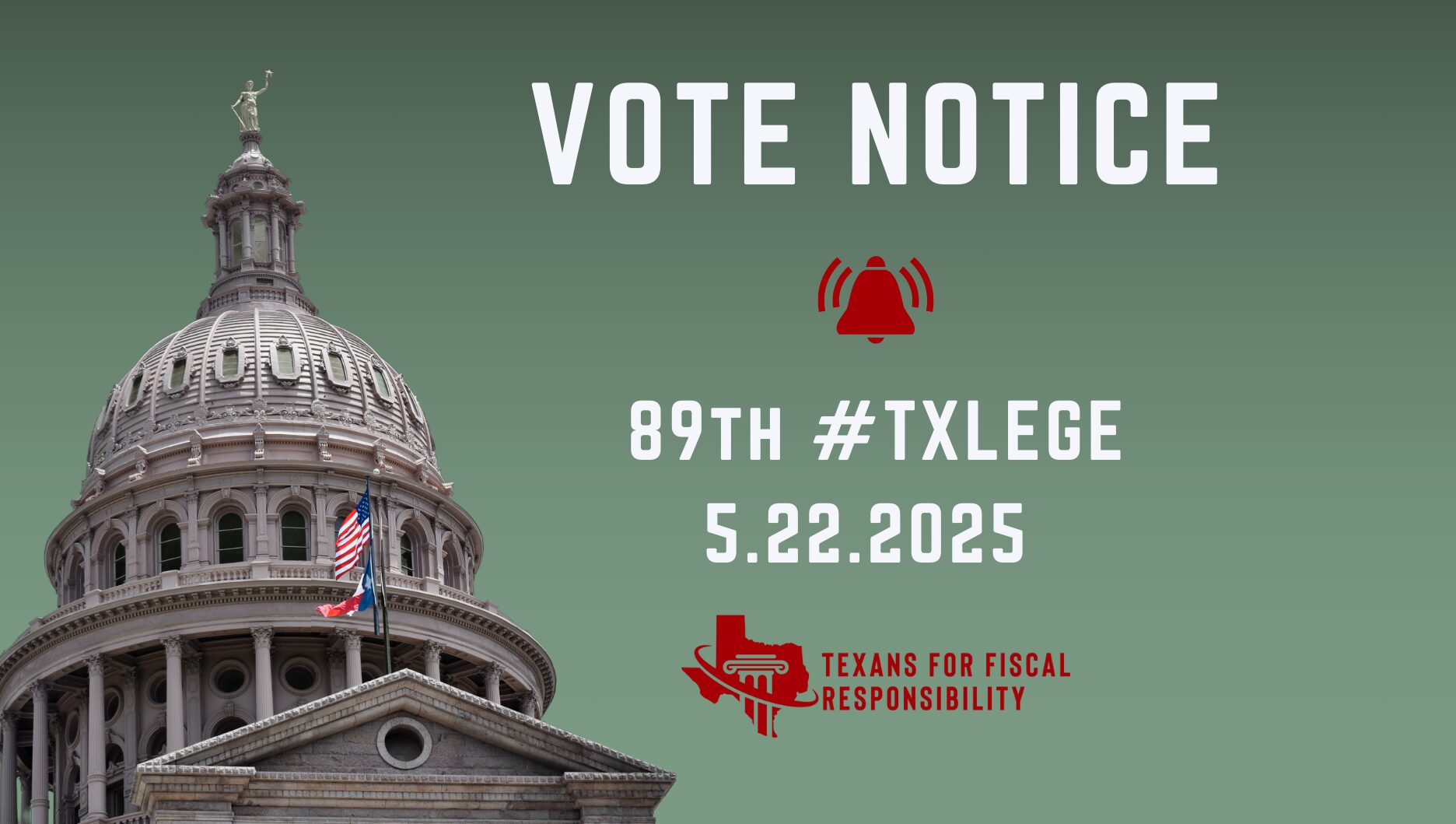
Texans for Fiscal Responsibility has issued the following vote notice for May 22nd, 2025
Texas House of Representatives
Subject: Senate Bill 263 (SB 263) – Tax fairness for radio broadcasters
- Author: State Sen. Charles Perry (R-Lubbock)
- Caption: Relating to the computation of the cost of goods sold by television and radio broadcasters for purposes of the franchise tax.
- TFR Position: SUPPORT
- Background:
- SB 263 ensures tax fairness by clarifying that both radio and television broadcasters are equally eligible to deduct their cost of goods sold when calculating franchise tax liability. The bill supports lower taxation, prevents regulatory ambiguity and reduces compliance costs and government overreach. For these reasons, TFR supports SB 263.
Subject: Senate Bill 924 (SB 924) – Blocks franchise fee expansion
- Author: State Sen. Kelly Hancock (R-North Richland Hills)
- Caption: Relating to entities that provide cable services or video services.
- TFR Position: SUPPORT
- Background:
- SB 924 ensures that municipalities cannot unjustly levy franchise fees on video streaming platforms and satellite TV services that do not use public infrastructure. This protects consumers from unnecessary cost increases and guards against government overreach into the digital marketplace. By limiting local taxing authority to services that physically use public rights-of-way, the bill preserves a fair regulatory environment. The bill promotes limited government, prevents backdoor tax hikes, and defends free-market principles.
Subject: Senate Bill 2064 (SB 2064) – Ends inheritance car tax
- Author: State Sen. Charles Perry (R-Lubbock)
- Caption: Relating to an exemption from certain taxes imposed on the transfer of a motor vehicle to a person from a decedent or the decedent’s estate.
- TFR Position: SUPPORT
- Background:
- SB 2064 eliminates the motor vehicle gift tax when a car is inherited from a deceased family member’s estate. While gifts between close family members are already exempt from this tax, inheritances from estates were oddly still taxed—this bill fixes that inconsistency. Removing the tax reduces the financial burden on grieving families, particularly those with modest means. It also prevents the government from taxing the same asset multiple times and simplifies the estate process. This bill respects private property rights, eliminates unnecessary taxation, and reduces bureaucratic red tape.
Subject: Senate Bill 1940 (SB 1940) – Streamlined estate planning
- Author: State Sen. Bryan Hughes (R-Mineola)
- Caption: Relating to authorizing a beneficiary designation that transfers a manufactured home classified as personal property at the owner’s death.
- TFR Position: SUPPORT
- Background:
- SB 1940 allows Texans who own manufactured homes to directly pass them on to chosen beneficiaries without going through probate. This bill empowers individuals with a simple, no-cost option to transfer property, reducing court involvement and legal expenses. It ensures government stays out of personal inheritance matters unless absolutely necessary and respects private ownership rights. This limited government approach gives Texans more control over their property and streamlines processes. Overall, the bill respects taxpayers, limits state intervention, and encourages responsible ownership and transfer planning.
Subject: Senate Bill 1376 (SB 1376) – Code enforcement flexibility
- Author: State Sen. Bryan Hughes (R-Mineola)
- Caption: Relating to the supervision requirements of a code enforcement officer in training.
- TFR Position: SUPPORT
- Background:
- SB 1376 removes a bureaucratic hurdle that delays local code enforcement in small or rural towns. Under current law, a trainee must be supervised by a registered officer, even when no such person exists in the department. This bill fixes that by allowing trainees to enforce codes independently if their employer doesn’t already have a registered officer. It empowers local governments to get the job done without needing to hire redundant oversight positions, saving taxpayer dollars. Instead of growing the size of government, it respects local autonomy and lets communities work within their existing resources. This change facilitates quicker training-to-work transitions and reduces compliance delays. It’s a small but meaningful step toward more efficient and cost-effective local governance.
Subject: Senate Bill 2148 (SB 2148) – Grid security coordination
- Author: State Sen. Bob Hall (R-Edgewood)
- Caption: Relating to the reliability of the electricity supply chain.
- TFR Position: SUPPORT
- Background:
- SB 2148 strengthens the reliability of Texas’ power grid by requiring electric providers and regulators to routinely prepare for physical attacks on critical substations. These facilities are key to keeping the lights on, and if sabotaged, could lead to widespread blackouts. The bill ensures that all major grid players—including power companies, ERCOT, and law enforcement—are on the same page through mandatory drills. It smartly protects sensitive infrastructure details from government overreach by not requiring disclosure of substation locations. This proactive approach avoids costly emergencies by emphasizing coordination and preparedness, not bureaucracy or mandates.
Subject: Senate Bill 1453 (SB 1453) – Prevents unnecessary debt taxation
- Author: State Sen. Paul Bettencourt (R-Houston)
- Caption: Relating to the current debt rate and tax rate of a taxing unit for ad valorem tax purposes.
- TFR Position: SUPPORT
- Background:
- SB 1453 ensures taxpayers only pay what is strictly necessary to service a local government’s existing debt by capping the Interest & Sinking (I&S) tax rate at the minimum required amount. This prevents local taxing entities from overcollecting and stockpiling excess revenue under the guise of debt payments. If higher rates are desired, the bill mandates transparency and a public vote with supermajority approval. By tightening financial discipline and requiring justification for any tax increases, the bill promotes limited government and protects taxpayers. It’s a prudent reform to curb unnecessary taxation and restore fiscal accountability.
Subject: Senate Bill 2137 (SB 2137) – Weakens housing credit oversight
- Author: State Sen. José Menéndez (D-San Antonio)
- Caption: Relating to the allocation of low income housing tax credits.
- TFR Position: OPPOSE
- Background:
- SB 2137 blocks the state from considering the quality of nearby public schools when deciding where to award low-income housing tax credits. This removes an important safeguard that helped ensure taxpayer-subsidized housing projects were not placed in areas with poor educational outcomes. By sidelining school quality, the bill risks steering public subsidies into areas that may already be struggling, potentially entrenching cycles of poverty. It weakens accountability in how public dollars are used. The bill also mandates a government study—adding another layer of bureaucracy.
Subject: Senate Bill 1677 (SB 1677) – Study on Diabetes Amputation
- Author: State Sen. José Menéndez (D-San Antonio)
- Caption: Relating to a study on prevention and reduction of diabetes-related amputation.
- TFR Position: OPPOSE
- Background:
- SB 1677 orders a Texas university to partner with the state health department and conduct an in-depth study on how to reduce amputations caused by diabetes. This includes gathering data, forming a task force of health professionals and patients, and creating policy proposals aimed at prevention, treatment access, and awareness. While the intention is to save lives and improve care, the bill commits public resources and personnel time without clear limits on scope or cost. It grows government under the guise of research, adds a layer of bureaucracy, and risks mission creep into healthcare regulation and insurance mandates. Studies such as this are better done in the private sector.
Subject: Senate Concurrent Resolution 8 (SCR 8) – Opposing federal central digital currency
- Author: State Sen. Tan Parker (R-Flower Mound)
- Caption: Expressing opposition to the creation of a central bank digital currency.
- TFR Position: SUPPORT
- Background:
- SCR 8 expresses Texas’s formal opposition to the creation of a central bank digital currency (CBDC), citing serious concerns over privacy, cybersecurity, and federal overreach. A CBDC could centralize financial data, making Americans more susceptible to surveillance and cyber threats, while weakening the role of private banks. This resolution promotes protecting individual financial freedom and guarding against costly federal expansions that could compromise both privacy and free-market principles. For these reasons, TFR supports SCR 8.
Texas Senate
Subject: House Bill 2 (HB 2) – Massive New Funding for Public Schools
- Author: State Rep. Brad Buckley (R-Salado)
- Caption: Relating to public education and public school finance.
- TFR Position: OPPOSE
- Background:
- HB 2 overhauls Texas’ public education finance system by dramatically increasing state spending, growing bureaucracy, and centralizing control under the Texas Education Agency. While the bill raises teacher pay and adds incentives for retention and designation, it does so through a sprawling set of mandates and grant programs that balloon the state’s financial obligations by over $7.8 billion in just two years. From a fiscally conservative standpoint, this is deeply concerning—there is no structural offset, no tax relief, and no sunset on the spending. The bill creates multiple new allotments, training requirements, and intervention mandates.
- However, the bill does include some worthy improvements for charter schools. HB 2 modernizes and expands facilities funding for charter schools by replacing the outdated cap with a scalable, formula-driven model. Charters will now receive funding closer to what districts can raise through I&S taxes, significantly improving equity in access to facilities resources. However, the new safeguards aim to limit misuse and restrict access for underperforming or financially unstable operators. These provisions move toward leveling the playing field between traditional ISDs and charters which operate more efficiently, often have a better track record of success, and help provide school choice options for families.
- Still, the few bright spots for charter schools do not outweigh the bill’s broader flaws. HB 2 represents an enormous increase in education spending. The nearly $8 billion in funding would be better spent on property tax relief and expanding Education Savings Accounts which provide more educational choice for Texas children and parents.
Subject: House Bill 2011 (HB 2011) – Protects property owners
- Author: State Rep. Cecil Bell Jr (R-Magnolia)
- Caption: Relating to the right to repurchase from a condemning entity certain real property for which ad valorem taxes are delinquent.
- TFR Position: SUPPORT
- Background:
- HB 2011 ensures greater accountability for government and quasi-government entities that seize private land through eminent domain. If a condemning entity fails to pay required property taxes for two years, the former owner has the right to buy back the land. This creates a strong incentive for entities to maintain financial responsibility and discourages the unnecessary or careless seizure of private property. The bill empowers property owners by granting them the ability to monitor tax compliance and act early to reclaim land. It promotes limited government by returning unused or mismanaged land to private hands.
Subject: House Bill 4044 (HB 4044) – University historic tax credit expansion
- Author: State Rep. Morgan Meyer (R-Dallas)
- Caption: Relating to certain expenditures by public institutions of higher education and university systems that are eligible for certain tax credits.
- TFR Position: OPPOSE
- Background:
- HB 4044 reopens a tax credit loophole for Texas public universities, allowing them to claim historic preservation tax credits. While framed as supporting rehabilitation efforts, this bill revives a costly carve-out that expired in 2021, burdening taxpayers to subsidize building renovations at state institutions. The credits result in millions in lost revenue—$3.36 million just in the first two years—and siphon funds from the Property Tax Relief Fund, effectively redirecting money away from taxpayers and public schools. The measure expands government subsidies to entities already funded by taxpayer dollars, increasing the cost to the public. Although the provision is set to expire in 2035, the damage over the next decade is significant.
Subject: House Bill 4396 (HB 4396) – Corporate Welfare
- Author: State Rep. Ken King (R-Canadian)
- Caption: Relating to the eligibility of the American Performance Horseman and the American Rodeo for funding under the major events reimbursement program.
- TFR Position: OPPOSE
- Background:
- HB expands a government-run subsidy program that reimburses costs for hosting certain major events, adding more private rodeo-related productions to the list of eligible recipients. By designating specific companies and their events for financial incentives, it increases taxpayer exposure to what is essentially a form of corporate welfare. Rather than focusing on essential services or broad tax relief, this bill commits public funds to selectively support private entertainment enterprises. It opens the door for more special interests to lobby for similar treatment, continuing the trend of ever-expanding government handouts. This undermines fiscal discipline and misallocates public resources to private entities under the guise of economic development. A more limited government approach would prioritize letting the free market determine the viability of such events without taxpayer backing.
Reminder: Vote Notices are provided to both Texas state lawmakers and the general public, sharing Texans for Fiscal Responsibility’s position on issues eligible to be rated as a part of the Fiscal Responsibility Index. Notices are provided prior to votes being taken in each legislative chamber.
Disclaimer: We reserve the right to consider amendments to legislation that may be introduced without notice as a part of issues to be rated on the Fiscal Responsibility Index. We will make every effort to provide notice on amendments that are pre-filed.




